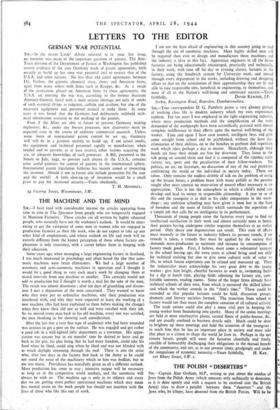GERMAN WAR POTENTIAL LETTERS TO THE EDITOR
SIR,—In the recent Lords' debate referred to in your last issue, no mention was made of the important question of patents. The Anti- Trust division of the Department of Justice at Washington has published certain evidence of the uses Germany made of patent agreements, both secretly to build up her own war potential and to restrict that of the U.S.A. and other nations. No less than 162 cartel agreements between I.G. Farben, the gigantic chemical trust, alone, and American firms, apart from many others with firms such as Krupps, &c. As a result of the restrictions placed on American firms by these agreements, the U.S.A. on entering the war was, according to the former Assistant Attorney-General, faced with a most serious shortage not only of stocks of such essential things as tungsten, carbide and atrabine, but also of the necessary equipment and personnel trained to make them. In some cases it was found that the Germans had deliberately withheld. tech- nical information essential to the working of the patents.
Even if the Allies are able in future to prevent Germany making explosives, &c., under any known processes, new discoveries must be expected even in the course of ordinary commercial research. Unless some form of international patent control be set up, Germany will still be in a position secretly to build up., if not actual stocks, the equipment and technical personnel rapidly to manufacture when needed and to prevent, or at least restrict, other nations acquiring the use, or adequate knowledge, of such processes. A Bill, presented to the Senate in July, 5942, to prevent such abuses in the U.S.A., contains some useful pointers for control of patents in the international sphere. International patent legislation hitherto has mainly aimed at protecting the inventor. Should it not in future also include protection for the user and the world? A little slowing-up of invention would be a small price to pay for increased security.—Yours obediently,


























 Previous page
Previous page